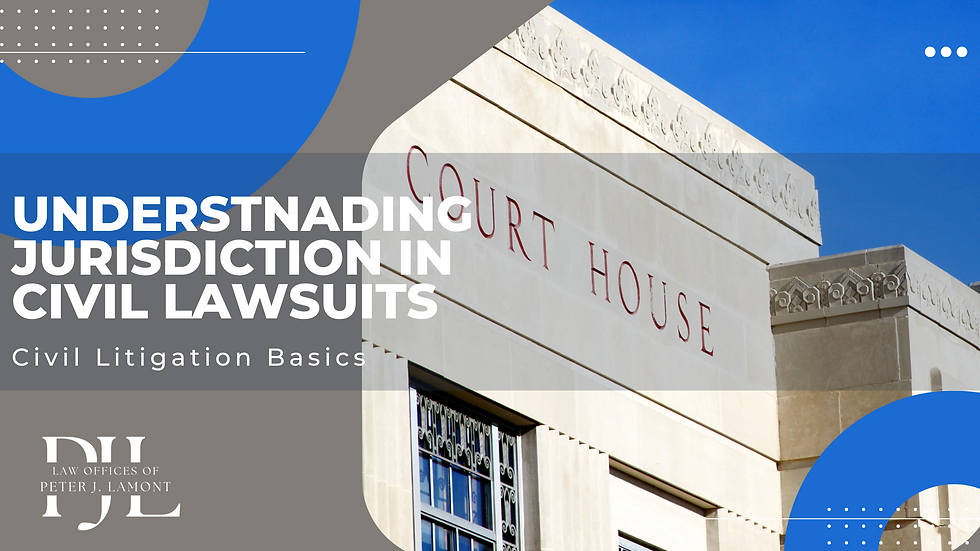Understanding Jurisdiction in Civil Lawsuits
- Peter Lamont, Esq.

- Mar 6, 2023
- 3 min read
Jurisdiction is a fundamental concept in civil law that determines which court has the power to hear a particular case. It refers to the court's authority over the parties, subject matter, and location of a legal dispute. In this blog, we will explore what jurisdiction means in a civil lawsuit and how it affects the legal process.

Civil lawsuits involve disputes between individuals, businesses, or organizations over various matters such as contracts, property, personal injury, and defamation. In such cases, the parties must file a complaint with the appropriate court that has jurisdiction over the case. Jurisdiction is determined by several factors, including the type of case, the parties involved, and the location of the dispute.
Subject Matter Jurisdiction
Subject matter jurisdiction refers to a court's authority to hear cases of a particular type or subject matter. For example, family courts have jurisdiction over divorce and child custody cases, while bankruptcy courts have jurisdiction over debt relief cases. In a civil lawsuit, the plaintiff must file their case in a court that has subject matter jurisdiction over the issue at hand.
Personal Jurisdiction
Personal jurisdiction, on the other hand, refers to the court's power over the parties involved in the case. A court has personal jurisdiction over a defendant if the defendant has sufficient contacts with the state or jurisdiction where the court is located. This means that a court cannot hear a case against a defendant who does not have sufficient contacts with the state or jurisdiction where the court is located.
In some cases, a court may also have jurisdiction over a defendant based on their consent or agreement to be subject to the court's authority. For example, a defendant may agree to be sued in a particular court as a condition of entering into a contract with the plaintiff.
Venue
Finally, the location of the dispute can also affect jurisdiction. Typically, a plaintiff must file their lawsuit in a court located in the same state or jurisdiction where the dispute occurred or where the defendant resides. This is known as venue, and it ensures that the court that hears the case is located in a convenient location for both parties.
Jurisdiction is a fundamental concept in civil law that determines which court has the power to hear a particular case.
Conclusion
In summary, jurisdiction is a critical factor in a civil lawsuit that determines which court has the power to hear the case. It is important for parties to understand the different types of jurisdiction and how they can affect the legal process. Filing a lawsuit in the wrong court can result in the case being dismissed, delayed, or transferred to another court, so it is essential to consult with an experienced attorney who can guide you through the process and ensure that your case is filed in the appropriate jurisdiction.
Do you have questions about civil litigation or defending a lawsuit? If so, contact us Today at our Bergen County Office. Call Us at (201) 904-2211 or email Us at info@pjlesq.com
_____________________________________________________________________________________________________
If you would like more information about this post or if you want to discuss your legal matter with an attorney at the Law Offices of Peter J. Lamont, please contact me at pl@pjlesq.com or at (201) 904-2211. Don't forget to check out and subscribe to our podcast and YouTube channel. We have hundreds of podcasts and videos concerning a variety of business and legal topics. I look forward to answering any questions that you might have.

DISCLAIMER: The contents of this website and post are intended to convey general information only and not to provide legal advice or opinions. The contents of this website and the posting and viewing of the information on this website should not be construed as, and should not be relied upon for, legal or tax advice in any particular circumstance or fact situation. Nothing on this website is an offer to represent you, and nothing on this website is intended to create an attorney‑client relationship. An attorney-client relationship may only be established through direct attorney‑to‑client communication that is confirmed by the execution of an engagement agreement.
As with any legal issue, it is important that you obtain competent legal counsel before making any decisions about how to respond to a subpoena or whether to challenge one - even if you believe that compliance is not required. Because each situation is different, it may be impossible for this article to address all issues raised by every situation encountered in responding to a subpoena. The information below can give you guidance regarding some common issues related to subpoenas, but you should consult with an attorney before taking any actions (or refraining from acts) based on these suggestions. Separately, this post will focus on New Jersey law. If you receive a subpoena in a state other than New Jersey you should immediately seek the advice of an attorney in your state as certain rules differ in other states.





Comments